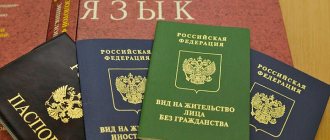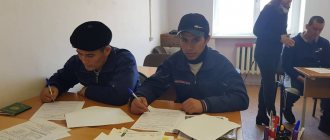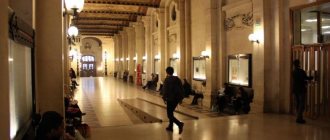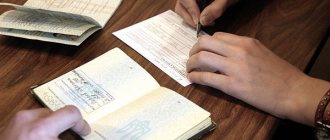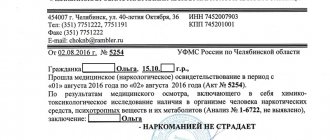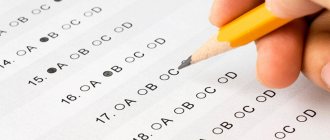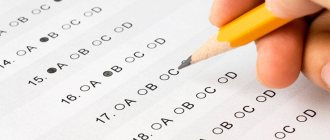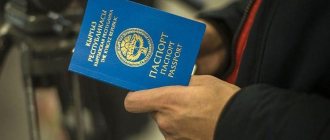TRKI exam: who needs it and why?
Any foreigner can take the Test of Russian as a Foreign Language (TRFL) and receive a certificate of language proficiency. The test was developed in 1995 by professors from four universities: Moscow State University, RUDN University, Pushkin Institute and St. Petersburg State University. These are the universities that issue certificates, but to take the exam you can contact the nearest accredited center. They are in different cities of Russia and even in other countries.
Levels of Russian proficiency
TRFL allows you to identify your level of Russian language proficiency. There are 6 levels in total, but only 4 of them are certification levels.
A1 - elementary level. Having command of the language at this level, a foreigner can read simple texts, understand advertisements and banners. Can participate in dialogue and answer questions. Talk about yourself, your friends, family and free time. The lexical minimum is 780 words.
A2 - basic level. Foreigners who know the language at a basic level can carry out more complex conversations, read texts and understand not only basic but also additional information. They can also fill out questionnaires and forms. The lexical minimum is 1,300 words. A certificate of knowledge of Russian at level A2 is sufficient to obtain citizenship.
A certificate of completion of the TRFL will definitely be useful to philology students and journalists. Photo: pexels.com
B1 is the first certification level. Foreigners must read and understand literary and journalistic texts, maintain dialogues on a wide range of topics, and be able to formulate and express their own opinions based on the texts they have read and heard. The lexical minimum is 2,300 words.
B2 is the second certification level. Those who speak Russian at this level read journalistic and artistic texts with elements of reasoning and a pronounced author’s assessment. They can start a dialogue themselves, freely express and defend their opinions during the conversation. The lexical minimum is 10,000 words.
C1 is the third certification level. This level allows you to read and understand highly specialized texts and freely discuss philosophical topics. The lexical minimum is 12,000 words. Foreigners must know the language at level C1 in order to receive a diploma at a Russian university or work as a philologist, journalist, editor, or translator.
C2 is the fourth certification level. It is close to the level of native speakers. To receive a C2 certificate, a foreigner must be able to communicate freely on any topic and construct sentences competently and logically, both in writing and orally. The lexical minimum is 15,000 words. Language proficiency at the C2 level is necessary for foreigners who want to conduct teaching or scientific activities in the field of the Russian language.
International state exam in Russian language TRKI
Home / Life in Russia / Russian language
- Information about learning Russian
- Russian language test for foreigners
- Exam in Russian language TRKI
© Depositphotos.com
Why do you need a Russian language test (TRFL), how to prepare and where to take the exam.
What is TRKI?
The abbreviation TORKI stands for Test of Russian as a Foreign Language. The English version of the name is also common – Test of Russian as a Foreign Language (TORFL). This is an international state exam to determine the level of Russian language proficiency. There is also testing “Russian language for professional purposes” - in tourism, in business. These are separate TRFL tests with thematic vocabulary.
How did TRKI appear?
The test appeared in Russia in 1995. Four universities took part in its development: the Pushkin Institute, RUDN University, Moscow State University and St. Petersburg State University. Today they are part of a testing consortium - they develop testing materials and issue certificates to those who successfully complete tasks. These universities have their own test centers in different countries where you can take the exam.
Why should a foreign applicant take the TRFL?
© MIPT
TRKI will be useful to those who plan to study at a Russian university in Russian. The test contains vocabulary that you will need during your studies. It is not necessary to have a certificate upon admission; each university decides independently whether to request a certificate from an applicant or not. However, in some cases, having a TRKI certificate can be an additional advantage. To clarify information about the package of documents, contact the university you want to enroll in. This can be done through the applicant’s Personal Account - register and write directly to the university. TRFL is also in demand by students who will need knowledge of the Russian language for work in the future. These are not only philologists and linguists, but also cultural scientists, oil workers, economists, and political scientists. They take a test to receive an official certificate confirming their language proficiency.
What levels does the exam include?
TORFL includes six levels: A1, A2, B1, B2, C1, C2. At the same time, only four levels are subject to certification, starting from B1 (that’s what it’s called – the first certification level).
- A1 (elementary level, 60-80 hours of preparation)
- allows you to master the simplest vocabulary: learn to say hello, say goodbye, make requests. - A2 (basic level, 160-200 hours of preparation)
– contains everyday vocabulary, will help you explain yourself in simple everyday situations (communication in a store, transport, restaurant). - B1 (first certification level, 400-480 hours of preparation)
– will help maintain social and business interaction, contains educational vocabulary. - B2 (second certification level, 560-680 hours of preparation)
– allows you to communicate freely, understand information from the media and lectures; use different language styles. - C1 (third certification level, 960-1200 hours of preparation)
– the ability to speak at a fast pace, without having difficulty finding words and expressions, to effectively use the language in studies and professional activities. - C2 (fourth certification level)
– native speaker level.
What is included in the test? Each test level consists of five subtests:
- Vocabulary; grammar;
- Reading;
- Listening;
- Letter;
- Speaking.
The duration of the test depends on the level and is at least 3.5 hours.
Where can I prepare for the test?
© SUSU
There are special short-term exam preparation courses based at test centers. As a rule, such courses are built on the principle of intensive training - applicants not only learn Russian to the required extent, but also adapt to the exam format. Sample tasks for passing certification testing and passing exams in the TRKI system are available on the website of the Institute named after. Pushkin. The Pushkin Institute also offers distance courses at various levels for studying the Russian language. The programs include practical classes with a teacher via Skype and independent work by students. There are also online courses for studying Russian in other Russian universities, for example, HSE, LETI, RUDN University.
What is the price? The cost and schedule of the exams are set by the test center where the TRFL is held. The price varies from 5,000 to 6,700 rubles ($76-103).
Where can I take the test?
To take the TORFL test, you need to contact accredited centers (see their list here) - only they have the right to conduct testing and issue a state TORFL certificate. Official platforms are open throughout Russia, as well as abroad: in America, Europe, Asia, Africa, and the CIS.
How is testing done?
© Pushkin Institute
You can get tested both in Russia and in other countries. Contact the accredited center in advance, find out the exam schedule, find out what documents are needed, and sign up if necessary. University staff come to centers located abroad with testing materials, conduct the test (on paper or in electronic format), pick up the work and take it away for checking. After this, a certificate is prepared and awarded to those who pass the exam.
Is it possible to take the TRFL remotely?
Yes, the exam can be taken remotely at any accredited examination center. Employees are responsible for compliance with the necessary technical conditions (requirements for premises, classroom equipment), for identifying the applicant, and for the confidentiality of materials. After the exam, the tests are also sent for verification; after a while, those who passed the test are awarded a certificate
Is it possible to retake the test if I didn’t succeed the first time?
To successfully pass the exam, you must score at least 66% on each subtest. If the test taker scores less than one percent on one of them, he has the right to take another test on the failed subtest - for an additional fee of 50% of the cost of the exam. The applicant is issued a certificate of passing the test, which indicates all the results. Within two years it can be presented for retaking at any accredited center. The results of successfully passed subtests are counted when retaking the exam.
How long is the TRKI certificate valid?
Unlike other language certificates, it does not expire. Each TRKI certificate has a unique number and is entered into a single database. This allows, firstly, to check its authenticity, and secondly, if necessary, request a duplicate.
Read more about studying Russian at universities here.
Exam structure
The exam consists of five subtests. The difficulty of the tasks depends on the level. We will talk in detail about the questions for the first certification level B1.
Vocabulary/grammar
This subtest includes 165 items. It allows you to check how well you know cases, verb forms, tenses and numbers. Below we provide examples of four typical questions from the test.
Time is Up!
Reading
The section consists of three texts with 20 questions. Texts can be very different - biographies, encyclopedic passages, excerpts from a guidebook. You are allowed to use a dictionary when completing assignments.
Listening
You will be asked to listen to 6 short texts, and then complete 30 tasks for them. The texts will be in different formats: everyday dialogues, excerpts from TV shows, fragments of lectures.
Letter
The section consists of two tasks. First, you must read the text, answer the question in detail and express your opinion on the proposed topic. Then you are asked to write a letter of at least 20 sentences. To make the task easier, you will be offered a list of questions to answer.
Speaking
The “Speaking” subtest includes 4 tasks. The first and second are performed immediately, to prepare for the third and fourth, you will be given a few minutes.
The first is participation in dialogues. The examiner will ask you questions that you need to answer quickly. Only detailed answers are counted; you cannot simply say “yes”, “no”, “I don’t know”.
During the second task, you will need to independently start dialogues on the proposed topics. There will be 5 of them.
In the third task you need to read the text, briefly retell it and answer 2 questions about it.
In the last task you will be asked to prepare a message on a specific topic. You will be given time to make a plan and prepare to respond. It must contain at least 20 replicas.
While completing the third and fourth tasks, you can use a dictionary.
You can't have a phone, but you can use a dictionary
The exam starts at 14:00. In one examination day, Volgograd Technical University can accept a group of migrants of no more than 24 people. The Testing Center staff cannot process more tests in one day. The tests last from two to four hours, depending on the migrant’s level of training, and after that the inspectors are required to enter all the results obtained into a single database and send them to Moscow. “Sometimes you have to stay until ten in the evening,” teachers say. Today, 21 people are taking the comprehensive exam. All are Russian speakers. Most of them are citizens of Uzbekistan, Ukraine, Azerbaijan, there are citizens of Moldova and even one migrant from Bosnia and Herzegovina. Since the applicants do not have any particular problems in speaking, the examiners hope that they will pass the tests quickly.
Examiners strictly monitor migrants' performance of tasks. Photo: AiF/ Nadezhda Kuzmina
The exam for migrants is similar to the Unified State Exam. Everything is extremely strict. The use of phones and cheat sheets is strictly prohibited. The only exception is the dictionary. “Over the past three years that we have been taking exams from migrants, we have not yet seen anyone with a dictionary,” admit the Testing Center. All exams are conducted in test format. Take one test, pass it, get another one. Examiners have no right to disclose the contents of assignments.
See: Exams for migrants →
“We can only say what you need to know in order to pass,” says Elena Tyumentseva. “For example, you need to know what state symbols look like, have an idea of public holidays, the basic rules of culture, and also know where a migrant can and should turn with what problems if his rights are violated.”
Migrants are prohibited from using phones during the exam. Photo: AiF/ Nadezhda Kuzmina
“I will describe specific situations to you and ask questions, and you will answer them,” says the examiner to Irina, who came to Volgograd from Ukraine.
The entire conversation between the migrant and the teacher is recorded on a voice recorder. This record is then sent, along with the test results, to Moscow for the foreigner to receive the appropriate certificate.
Example of a Russian language test
“After the listening, there is a letter where the migrant is asked to fill out some form or application for employment,” says the teacher, “and then there is reading. The migrant is asked to read a short passage of text and answer questions about it.”
Irina is released literally after 10 minutes: “I think I passed,” the girl says as she walks.
“If a person doesn’t pass, he can always retake,” says Elena Tyumentseva. — The state fee for passing the exam to obtain a labor patent is 3,900 rubles, for obtaining a residence permit and temporary residence permit — 5,300 rubles. The comprehensive exam consists of seven parts. Five of them are on the Russian language and two parts are on history and the basics of legislation. If a person fails any one of these parts, retaking the test costs 1,800 rubles. If he fails two parts, then retaking the exam costs 2,400 rubles. The number of retakes, as well as their time, is not limited. If the applicant does not pass today, he can come tomorrow and try again. Since the law does not establish a procedure for retaking exams, migrants can take them countless times.”
Where to go to take the exam?
The exam is taken only in accredited centers. They are located throughout Russia, in the USA and several countries in Europe and the CIS.
List of head centers where you can take the exam in Russian as a foreign language
Each center independently sets the cost of the exam, and it also depends on the level - the higher it is, the more expensive the testing costs. For example, the price of testing for level A2, which is required for citizenship, ranges from 3,000 to 6,000 rubles. But the cost of testing C2 can reach 8,000 rubles.
There is an exam, but there is no quota.
“I think I passed!”
— the dark-haired young man carefully closes the door behind him with the sign “Testing Center for Migrants in the Russian Language.” "Difficult? Scary? Are they helping? — he is immediately bombarded with a barrage of questions from migrants, whose relatives at this time are still answering to the examiner. Families come here.
Migrants come to exams with their relatives. Photo: AiF/ Nadezhda Kuzmina
"Not scary. They help there, especially those who sit at the very end,” the foreigner answers in fluent Russian. The young man's name is Alexander . Last year he moved to Volgograd from Kazakhstan. He says he was “drawn to his historical homeland”:
“My grandfather was a Don Cossack,” says Alexander, “my wife and I sold everything in Karaganda and decided to move here, to the south, with our children. We arrived in July 2014, and then the quotas ran out - they were given to refugees due to the difficult events in Ukraine.”
“Okay! Why are you so worried? — Alexander’s wife Tatyana joins the conversation . “Everything will work out, everything is almost done.”
From January 1, 2015, all migrants in Russia take tests in the Russian language, history and basic legislation of the Russian Federation. Photo: AiF/ Nadezhda Kuzmina
How is testing done?
First of all, choose the center where you will take the test. You can see the exam schedule on its official website. Be sure to check if pre-registration .
Almost everywhere the exam lasts 2 days. In the first you take “Writing”, “Vocabulary”. Grammar" and "Reading", in the second - "Listening" and "Speaking".
The duration of the TRFL depends on the level
Be sure to take your passport and two pens with you to the exam, pay for the test in advance and don’t forget your receipt. Check with your chosen center to see what other documents they may require from you.
The test results will be communicated to you within two weeks, often they become known within 3-4 days. Upon successful completion, a permanent certificate of proficiency in Russian is issued. To obtain it, you must correctly complete 66% of the tasks in each section. If you score less on one of the subtests, you can retake it for half the cost.
Tips for preparing for Russian language testing
Tips for passing the exam
- Before the exam, listen to the instructions carefully.
- If you are unable to read assignments due to poor print quality, be sure to inform your examiner.
- Turn off your mobile phone and do not take it out during the exam.
- Do not distract other participants by talking.
- Bring a bottle of water and chocolate with you.
- If you become ill during the exam, please inform your invigilators.
Subscribe to Migranta Rus: Yandex News.
